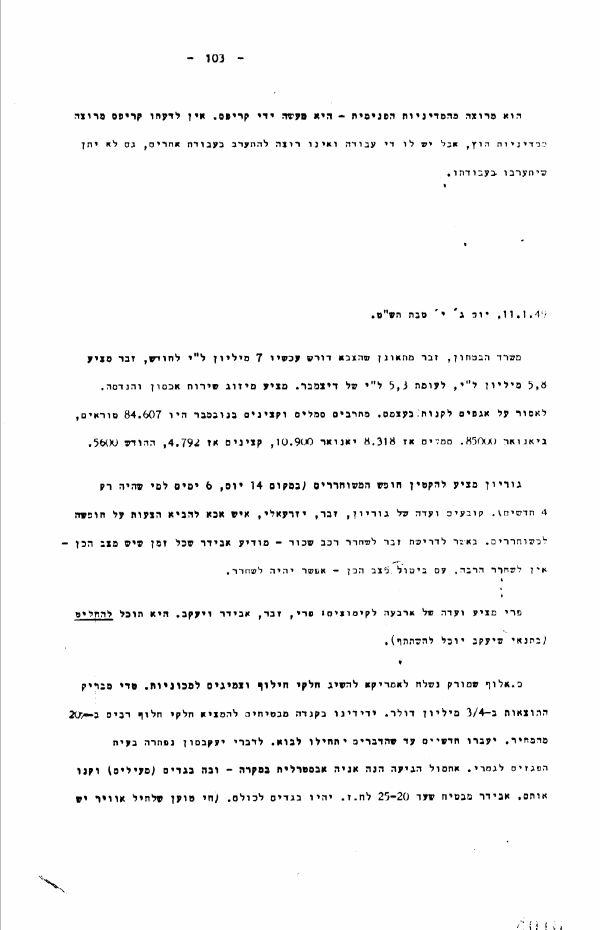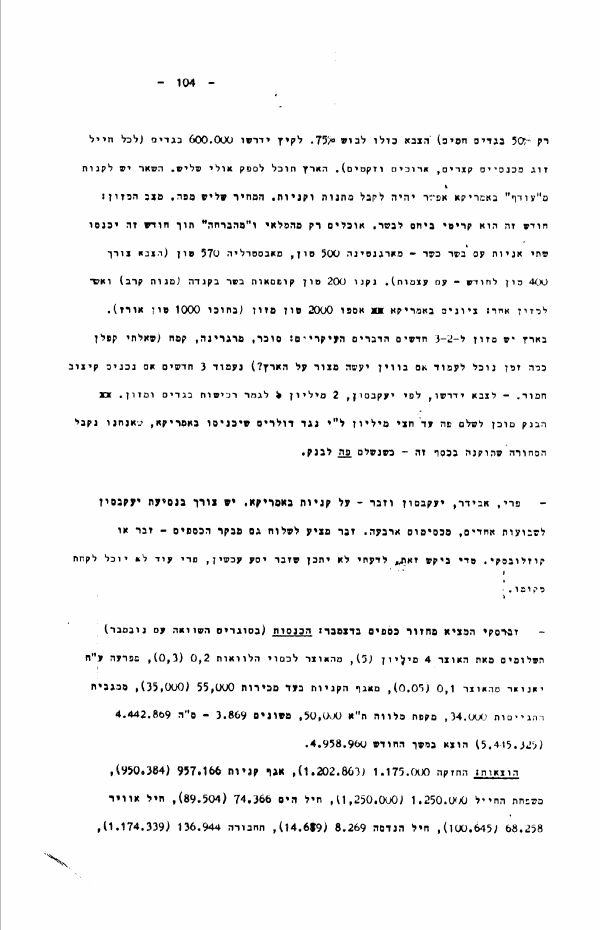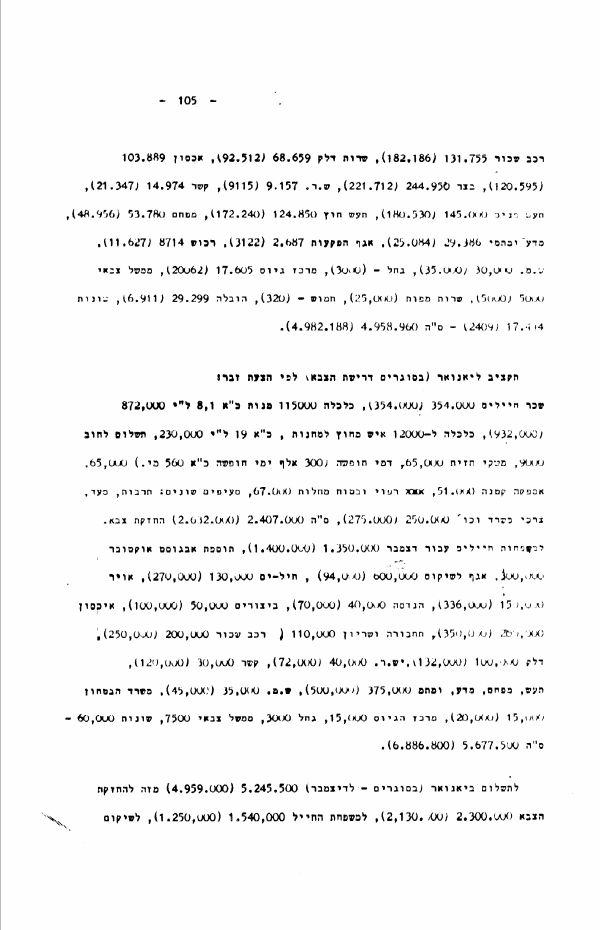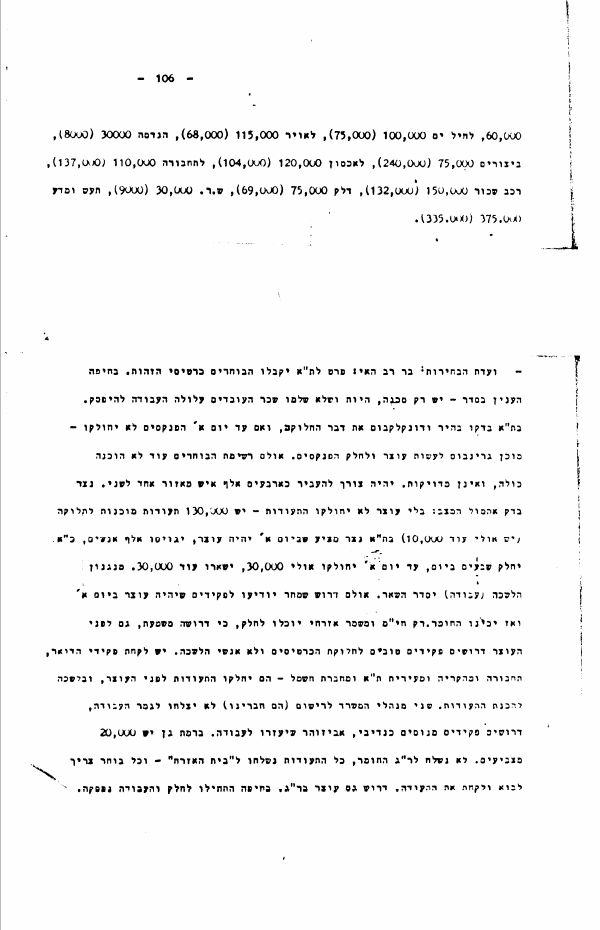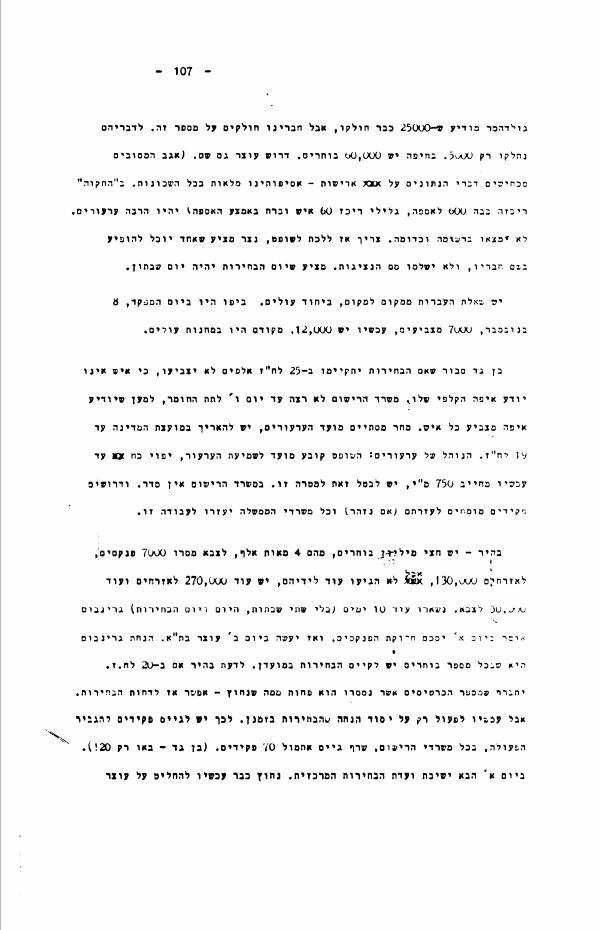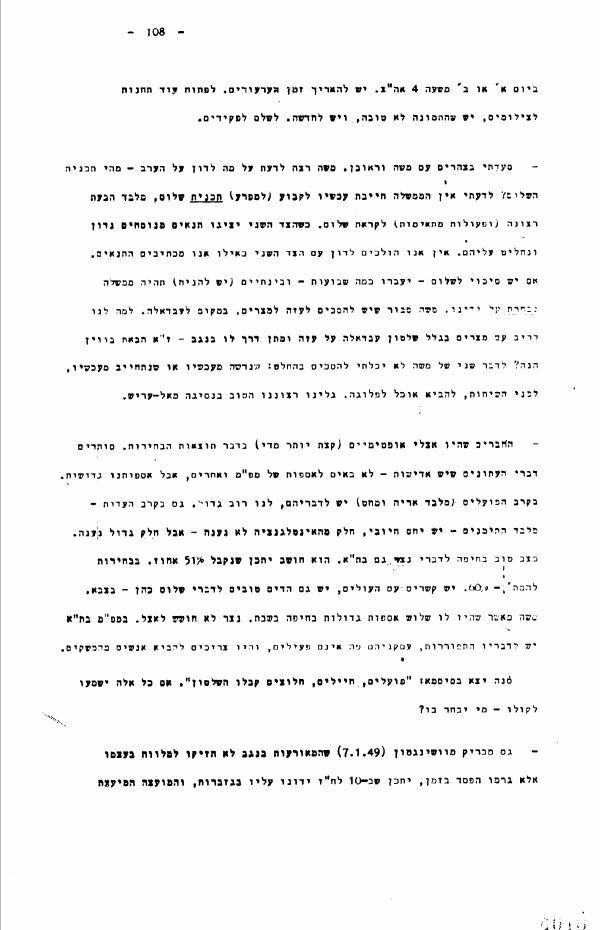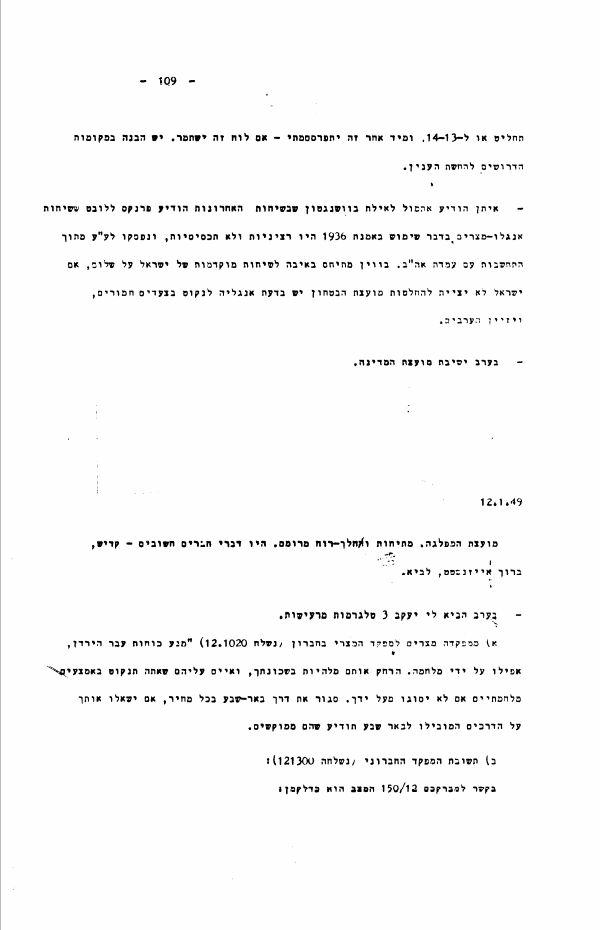Tuesday, January 11, 1949
Defense Ministry, Zabar is complaining that the army is now demanding P£ 7 million per month, Zabar proposes P£ 5.8 million, compared with P£ 5.3 million for December. He proposes merging the housing and engineering services. Prohibiting the departments from making purchases for themselves. Sergeants and officers are becoming more numerous[;] in November there were 84,607 privates, in January 85,000. Sergeants then [numbered] 8,318[, in] January 10,900, officers then [numbered] 4,792, this month 5600.
Gurion proposes reducing vacation for those released (instead of 14 days, 6 days for whoever was just 4 months). They're forming a committee of Gurion, Zabar, Yizraeli, a Personnel Department person to present proposals on vacation for those released. As to Zabar's demand to release rental vehicles - Avidar asserts that as long as there is a state of readiness not many can be released; once the state of readiness is canceled - [they] can be released.
Peri proposes a committee of four for cuts: Peri, Zabar, Avidar, and Ya'akov. It will be able to decide (on the condition that Ya'akov can participate).
Lt. Colonel Shmurak was sent to America to obtain spare parts and tires for vehicles. Teddy cables [that] the expenses [total] ¾ million dollars. Our friends in Canada promised to find many spare parts at 20% of the price. It will take two months before things start to arrive. According to Yaakovson the shells problem has been completely resolved. Yesterday an Australian ship arrived here coincidentally, with clothing (coats) and they bought them. Avidar promises that by the 20th-25th of this month there will be clothing for everyone. (Hai [Issachar] claims that the Air Force only has 50% warm clothing) the army as a whole is 75% clothed. For the summer 600,000 pieces of clothing will be required (short pants, long [pants], and jackets for each soldier). The country might be able to provide a third. The rest has to be bought from "surplus." In America it will be possible to get gifts and purchases. The price is a third of [the price] here. The food situation: this month is critical in terms of meat. They're eating only from reserves and from "smuggling." This month two ships with kosher meat will arrive - 500 tons from Argentina, 570 tons from Australia (the army consumes 400 tons per month - with bones). 200 tons of canned meat were bought in Canada (battle rations) and as to the other food: Zionists in America collected 2,000 tons of food (including 1,000 tons of rice). In the country there's food for 2-3 months[;] the main things: sugar, margarine, flour (I asked Kaplan[:] How long will we be able to hold out if Bevin imposes a siege on the country?) We'll held out three months, if we implement strict rationing. - The army will require, according to Yaakovson, 2 million to finish purchasing clothes and food. The bank is prepared to pay up to P£ 0.5 million here as against dollars inputted in America, so that we receive the goods bought with this money - when we pay the bank here.
- Peri, Avidar, Yaakovson, and Zabar - on procurements in America. The four agree that Yaakovson needs to go there for a few weeks. Zabar proposes also sending a financial auditor - Zabar or Kozlowski. Teddy requested this. In my opinion it's not possible for Zabar to travel now; Peri still can't replace him.
- Zabrasky presented the financial statement for December: Income (parenthetically - compared with November) payments from the Finance [Ministry] 4 million (5), from the Finance [Ministry] to cover loans 0.2 (0.3), deposit as against January from the treasury 0.1 (0.05), from the Procurements Department for sales 55,000 (35,000), from the Mobilization Fund 34,000, from the Tel Aviv loan fund 50,000, from miscellaneous 3.869 - total 4,442,869 (5,445,325) spent during the month 4,958,960.
Expenses: Upkeep 1,175,000 (1,202,863), Procurements Department 957,166 (950,384), soldier's family 1,250,000 (1,250,000), Navy 74,366 (89,504), Air Force 68,258 (100,645), Engineering Corps 8,269 (14,689), transport 136,944 (1,174,339), rental vehicles 131,755 (182,186), fuel service 68,659 (92,512), housing 103,889 (120,595), fortification 244,950 (221,712), M.S. [medical service?] 9,157 (9,115), signal 14,974 (21,347), domestic Ta'as [weapons manufacturing] 145,000 (180,530), foreign Ta'as 124,850 (172,240), chemicals factories 53,780 (48,956), science and RPCD [Research and Production Coordination Department] 29,386 (25,084), Expropriations Department 2,687 (3,122), property 8,714 (11,627), I.S. [Intelligence Service] 30,000 (35,000), GAHAL - (3,000), recruitment center 17,605 (20,062), military government 5,000 (5,000), mapping service (25,000), armament - (320), cargo transport 29,299 (6,911), miscellaneous 17,444 (2,409) - total 4,958,960 (4,982,188).
Budget for January (parenthetically - the army's request) according to Zabar's proposal: soldiers' wages 354,000 (354,000), subsistence 115,000 rations each P£ 8.1 872,000 (932,000), subsistence for 12,000 men outside of the camps, P£ 19 each 230,000, payment for debt 9,000, frontline settlement 65,000, vacation wages (300,000 vacation days 560 mil each) 65,000. Minor supplies 51,000, illness recovery and insurance 76,000, various provisions: culture, welfare, office supplies, etc. 250,000 (275,000), total 2,407,000 (2,632,000) military upkeep. For soldiers' families for December 1,350,000 (1,400,000), August October supplement 300,000, rehabilitation department 600,000 (94,000), Navy 130,000 (270,000) Air [Force] 150,000 (336,000), engineering 40,000 (70,000), fortifications 50,000 (100,000), housing 200,000 (350,000), transport and armoring 110,000, rental vehicles 200,000 (250,000), fuel 100,000 (132,000), M.S. [medical service?] 40,000 (72,000), signal 30,000 (120,000), Ta'as, chemicals factories, science, and RPCD [Research and Production Coordination Department] 375,000 (500,000), I.S. [Intelligence Service] 35,000 (45,000), Defense Ministry 15,000 (20,000), recruitment center 15,000, GAHAL 3,000, military government 7,500, miscellaneous 60,000 - total 5,677,500 (6,886,800).
Payments in January (parenthetically - in December) 5,245,500 (4,959,000), of which for the army's upkeep 2,300,000 (2,130,000), for the soldier's family 1,540,000 (1,250,000), for rehabilitation 60,000, for the Navy 100,000 (75,000), for the Air [Force] 115,000 (68,000), engineering 30,000 (8,000), fortifications 75,000 (240,000), for housing 120,000 (104,000), for transport 110,000 (137,000), rental vehicles 150,000 (132,000), fuel 75,000 (69,000), M.S. [medical service?] 30,000 (9,000), Ta'as and science 375,000 (335,000).
- Shaul investigated Isser [Be'eri]'s claim regarding the cables that implicate A.H. [Abba Khoushy] and it turns out that the cables were ordered by Isser [Be'eri]. I instructed Ya'akov to investigate the matter immediately. David S. [Shaltiel] for obvious reasons doesn't want this task to be assigned to him, and Ya'akov will assign it to Yisrael Amir.
The elections committee: Bar Rav Hai: Aside from Tel Aviv, the voters will receive identity cards. In Haifa things are okay - there's just a risk that because workers' wages have not been paid, work might stop. In Tel Aviv Bahir and Dunkelblum examined the distribution issue, and if the cards are not distributed by Sunday, then Gruenbaum is prepared to impose a curfew and distribute the cards. However, the list of voters is not yet been completed, and they're not accurate. It will be necessary to transfer about 40,000 people from one area to another. Yesterday Netzer assessed the situation: without a curfew the IDs won't be distributed - there are 130,000 IDs ready for distribution (there might be another 10,000). In Tel Aviv Netzer proposes that there be a curfew on Sunday, a thousand people will be recruited, each will distribute 70 per day, by Sunday maybe 30,000 will be distributed, another 30,000 will remain. The (Employment) Bureau will sort out the rest. But the officials must be informed tomorrow that there will be a curfew on Sunday and then they'll prepare the material. Only garrison and the civil guard can distribute, because discipline is needed, and before the curfew as well, good officials are needed to distribute the cards rather than the bureau personnel. Officials should be taken from the post office, transport, the Kirya [government compound], and the Tel Aviv municipality and the electric company - they'll distribute the IDs before the curfew, and in the bureau [they'll] prepare the IDs. The two directors of the registration office (members of ours [Mapai?]) won't be able to finish the work; experienced officials such as Nadivi [sp.], Avizohar are needed to help with the work. In Ramat Gan there are 20,000 voters. The material was not sent to Ramat Gan; all the IDs were sent to Beit HaEzrah [the Citizens' Center?] in Ramat Gan - and each voter has to go and pick up the ID. A curfew is also necessary in Ramat Gan. In Haifa they started distribution and the work stopped. Goldhammer reports that 25,000 have already been distributed but our members dispute this number. According to them only 5,000 were distributed. In Haifa there are 60,000 voters. A curfew is also necessary there. (Incidentally, the participants dispute the data on apathy - our assemblies are full in all the neighborhoods. In "HaTikva" Bebe drew 600 for an assembly, Galili drew 60 people and fled in the middle of the assembly.) There will be many appeals. They won't appear in the list and so on. Then it will be necessary to go to a judge, Netzer proposes that one person can appear in the name of his friends, and they won't pay a representation fee. He suggests that election day be a work holiday.
There are questions of transfers from one place to another, especially immigrants. In Jaffa on the day of the census, November 8, there were 7,000 voters; now there are 12,000. They were in immigrant camps earlier.
Ben Gad thinks that if the elections take place on the 25th of this month, thousands won't vote, because no one knows where his polling station is. The registration office didn't want to provide the material, notifying where each person would vote, until Friday. Tomorrow the appeals period ends; it needs to be extended until the 19th of this month by the State Council. The procedure for appeals: the judge sets a date to hear the appeal, until now a representative has cost 750 mil, which should be canceled for this purpose. There is no order in the registration office. And expert officials are needed to help them (if we're careful [?]) and the government ministries and offices will assist in this work.
Bahir - there are half a million voters, of whom 400,000 [?], the army was provided with 7,000 cards, civilians with 130,000 but they haven't reached them yet, there are another 270,000 for civilians and another 30,000 for the army. There remain another 10 days (not counting two Saturdays, today, and election day)[.] Gruenbaum says that on Sunday he'll conclude the distribution of cards, and then on Monday he'll impose a curfew in Tel Aviv. Gruenbaum's assumption is that for every number of voters the elections should be held on their date [?]. In Bahir's view, if on the 20th of this month it turns out that the number of cards that were delivered is less than the amount needed - then the elections can be postponed. But for now [we] should only operate on the assumption that the elections [will take place] as scheduled. Towards this end officials should be enlisted and activity increased, in all the registration offices; yesterday Sherf enlisted 70 officials. (Ben Gad - only 20 came!). Next Sunday is the central elections committee meeting. It's already necessary to decide on a curfew on Sunday or Monday beginning at 4 p.m. The time for appeals needs to be extended. More picture-taking stations should be opened; sometimes the picture isn't good and needs to be renewed. The officials should be paid.
- I lunched with Moshe [Sharett] and Reuven [Shiloah]. Moshe wanted to know what should be discussed tonight [in the State Council] - what is the peace plan [in advance of the Rhodes talks]. In my view the government doesn't need to decide on a peace plan (in advance) at this time - but only to express its will (and appropriate activities) in preparation for peace. When the other side presents specific conditions, we'll discuss and decide on them. We're not going to discuss matters with other side as if we're dictating the terms. If there is a chance for peace - a few weeks will pass - and in the meantime (presumably) there will be a government elected by us. Moshe thinks we should agree to [give] Gaza to Egypt, instead of Abdallah. Why should we clash with Egypt over Abdallah's rule in Gaza and [the matter of] giving him passage in the Negev - which means bringing Bevin here? I couldn't completely agree on Moshe's second point: that henceforth we'll permit, or that henceforth we'll commit, before the talks, to bringing food to Faluja. We demonstrated our goodwill in withdrawing from El-''Arish.
- The [Mapai] members who came to see me were optimistic (a bit too much) regarding the election results. They dispute the newspaper reports that claim there's apathy - [people] don't come to Mapam's and others' assemblies, but our assemblies are jampacked. Among the workers (except for Aryeh and Mahat [sp.]), according to them, we have a large majority. Also among the ethnic communities - aside from the Yemenites - there's a positive attitude, some of the intelligentsia hasn't responded - but a large portion has responded. The situation in Haifa is good [and] according to Netzer in Tel Aviv as well. He thinks it's possible that we'll receive 51%. In the Hist. [Histadrut] elections - 60%. There are ties with the immigrants, [and] there are also good vibes according to Shalom Cohen - in the army. Moshe confirms that he held three large assemblies in Haifa on Saturday. Netzer isn't concerned about ETZEL. In Tel Aviv Mapam is experiencing some disintegration according to him; their delegates here are not active, and they should have brought people from the settlements.
Sneh presented a slogan: "Workers, soldiers, halutzim [Zionist pioneers] take the government." If they all listen to him - who will elect him?
- [Oscar] Gass cables from Washington (January 7, 1949) that the events in the Negev [Operation Horev] didn't jeopardize the loan [from the United States] itself, but did cause a delay. It might be discussed in the treasury on the 10th of this month, and the advisory council will decide either on the 13th or the 14th, and immediately afterwards it will announce when - if this schedule is maintained. It's understood in the relevant places that the matter should be expedited.
- [Walter] Eytan informed [Eliahu] Elath yesterday in Washington that during the most recent talks [British Ambassador Oliver] Franks informed Lovett that the Anglo-Egyptian talks on invoking the 1936 treaty were serious and were not a ruse, and have been suspended for now out of consideration for the US position. Bevin has a hostile view on Israel's preliminary peace talks. If Israel does not abide by the Security Council decisions, England is inclined to take serious measures, and will arm the Arabs.
- In the evening State Council.





